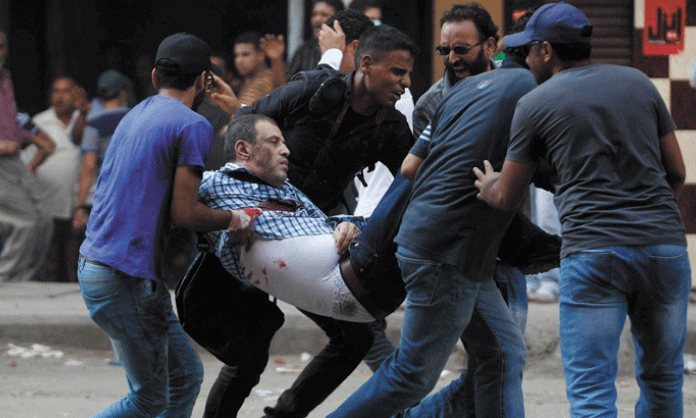Nine hundred people have been killed in Egypt in the past week, the vast majority of them supporters of the former Muslim Brotherhood government led by President Morsi. Brotherhood supporters have been protesting in their tens of thousands demanding the reinstatement of Morsi, who was overthrown by the army following huge anti-government demonstrations on 30 June.
The Brotherhood supporters have died at the hands of the army and security forces of the interim government headed by Prime Minister Hazem el-Beblawi, which was installed in power by the army in early July.
A state of emergency and a curfew have been imposed. Dictatorial powers once wielded by Mubarak have now been placed in the hands of the military, led by General Abdul-Fattah el-Sisi, who is the real power in the land. More than 1,000 Brotherhood supporters were arrested on Saturday alone, Morsi remains in detention awaiting trial, and there is now talk of banning the Brotherhood, returning it to the illegality it suffered under ousted dictator Hosni Mubarak.
The Brotherhood, whose members have been violently driven out of the squares in Cairo that they were occupying until last week, has vowed to continue protesting, despite the massacres. The army is following its supporters, forcing them out with guns and tear gas from whichever mosque or protest camp they seek to regroup in. Vicious cruelty has been meted out in scenes of savagery not seen since the 25 January revolution. The deaths of the past week come on top of dozens of others in the weeks after Morsi’s deposing.
Beblawi, a right wing politician backed by business interests, has being working arm in arm with the generals to rehabilitate the Mubarak regime. A string of former high-ups has been reinstated to positions of power, while the interior minister has publicly proclaimed his desire to use the police to terrorise the streets just as Mubarak did for decades. Little wonder, then, that President Obama steadfastly refuses to cancel the US$1.5 billion in annual grants to the Egyptian military: the White House shares with the generals a desire for the re-establishment of the old order.
El-Sisi’s project is to use popular support for the army’s crushing of the Brotherhood to restore public confidence in the military, something that was trashed in 2011-12 when the high command ran the country for 16 months. He wants the Egyptian public to forget about the mass torture and deaths in that period.
The Brotherhood’s failure to garner public support as its members fall to army bullets is testimony not just to the barrage of hostile propaganda issuing from both state and independent media which label its members as terrorists. It is also due to its complete failure to deliver on the demands of the 2011 revolution – not just democracy but also jobs, better wages, decent housing and retribution for the revolutionary martyrs.
In office, Morsi and Co. continued the Mubarak and armed forces policy of neoliberalism and political authoritarianism. Their support quickly shrank as the president and parliament introduced one anti-democratic measure after another. Their spokespersons spewed sectarian bile against the country’s Christian minority, which accounts for 10 per cent of the population.
And now the Brotherhood is reacting to the massacre of its members by unleashing a wave of attacks on churches and priests. At least nine churches in four parts of the country have been torched since last Wednesday, and community leaders say the figure could be as high as 20. The armed forces, while using these attacks as justification for their murder of the Islamists, are simply standing by.
For the time being, the numbers of those who oppose both the massacres and the return of the Brotherhood are small as the political situation is highly polarised. Hatred of the Brotherhood runs high, and not just by those who are natural allies of the army. Nonetheless, it is important at this critical time to demarcate a revolutionary line independent of both camps.
The Revolutionary Socialists of Egypt have issued a statement responding to the military’s massacres and calling on revolutionaries to stand against the rule of the army and defend the aims of the Egyptian Revolution against attacks from whichever quarter.











